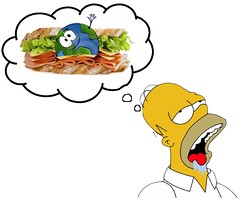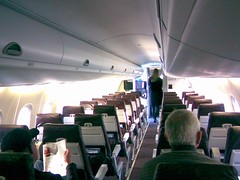22 Apr 2009
Someone, please call the FTC! I may post my blog on Google, store my mail and calendar and notes on Google, teach people how to make maps using Google, but even I have my limits.
The Google Profile leverages Google search monopoly (you listening, FTC?!?!) into a you-must-join social network. I like LinkedIn as a professional social network, but this is going to blow all that out of the water. Want to be found? To control your professional image? Yes, having a decent personal site will still be important, but now the starting point for a personal search (Google Search) is also the end point (Google Profile).
Can you afford to not have Google Profile? I don’t think I can, and I think that stinks.
Update: Apparently I wasn’t clear about my point: because Google controls search, their Profile is a must-have for anyone who expects to be looked up on the internet (independent contractors, mobile professionals, me). It is not optional. It’s a Google world. Comply.
22 Apr 2009

Happy Earth Day! If you missed the earth sandwich three years ago, here’s a chance to re-live the dream!
Mmmmmmm. Earth sandwich.
21 Apr 2009
Somehow, I missed this video in the geoblog meme-stream, so for all the rest of you who also missed it:
http://www.youtube.com/v/f1iPe0LtCew&hl=en&fs=1
And since I’m posting YouTube links, you must watch this unlikely Scottish talent show contestant blow the audience and judges away (figuratively).
14 Apr 2009
 For a number of years now, I have watched with longing as Where 2.0 slipped past me on the calendar. I love the idea of a geo-conference where most of the attendees are not in the government/land management/asset management realm. Unfortunately, trivial matters like the births of children and so on have gotten in the way of my attending, thus far. But not this year! This time out, I’m going to Where, and I’m going to be teaching a short course on spatial databases. Spatial SQL is a powerful tool, so powerful that you don’t require much more than a spatial database and a web mapping API to do some nifty stuff. OSGeo will have a booth this year, so if you’re at Where and you want to talk databases, track me down there.
For a number of years now, I have watched with longing as Where 2.0 slipped past me on the calendar. I love the idea of a geo-conference where most of the attendees are not in the government/land management/asset management realm. Unfortunately, trivial matters like the births of children and so on have gotten in the way of my attending, thus far. But not this year! This time out, I’m going to Where, and I’m going to be teaching a short course on spatial databases. Spatial SQL is a powerful tool, so powerful that you don’t require much more than a spatial database and a web mapping API to do some nifty stuff. OSGeo will have a booth this year, so if you’re at Where and you want to talk databases, track me down there.
Reminder: If you’re reading this before Wednesday, you still have time to register before the early bird rates go away.
13 Apr 2009
On my last trip through SeaTac, I thought my thin copy of WiReD was a physical harbinger of the recession. This time, the state of my flight from Victoria was a pretty clear sign.

Oh boy.






